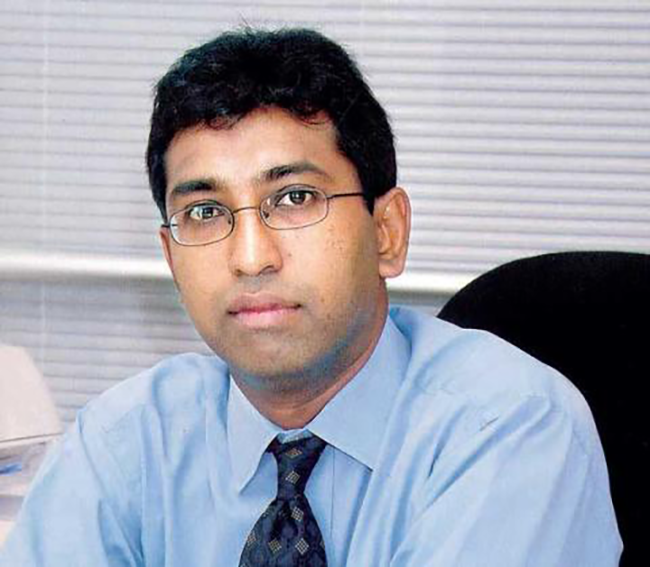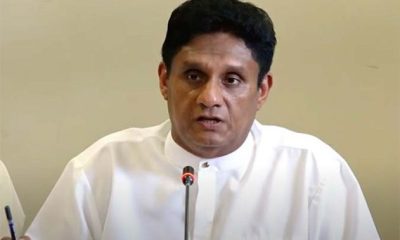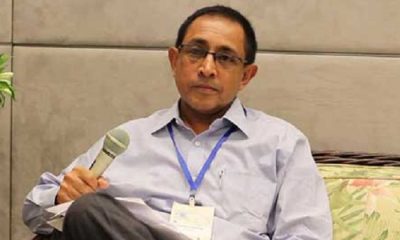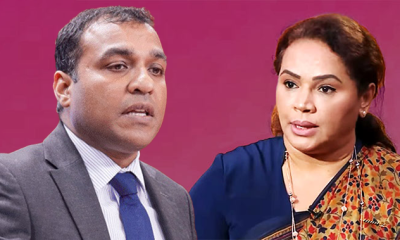News
SJB warns against counting foreign loans as part of forex reserves

The SJB has cautioned the Wickremesinghe-Rajapaksa government against counting loans received from the IMF, World Bank and ADB as external buffers as they have to be paid back.
SJB MP Dr. Harsha de Silva said loans secured from whatever sources weren’t earned reserves. The former UNP State Minister and economist said so when we sought his opinion on the government declaration that with the IMF second tranche amounting to USD 337 mn and WB’s USD 250 mn loan official reserves were expected to pass USD 4 bn by end of next week.
The President’s Media Division (PMD) said that this figure was much higher than expected. The PMD issued the statement hours after SLPP leader Mahinda Rajapaksa, in a statement issued to the media declared that USD 10,000 million in new ISBs borrowed between 2015 and 2019 broke the back of our economy. The former President found fault with the Sirisena-Wickremesinghe administration.
The SJB MP said: “Generally, the net international reserves refers to gross usable reserves less short term drains. Now this is where the lies of the Rajapaksa regime led to a false sense of security on usable reserves. Why did Foreign Minister Ali Sabry, PC, announce on 12 April 2023 that the government was unable to meet two external debt payments amounting to approximately USD 200m even though former CBSL Governor Ajith Nivard Cabraal had claimed we had some USD 1.6 b in reserves?
Truth is the government apparently had only USD 20 m of usable reserves and not USD 1.6b. The USD 1.5b Chinese currency swap was not usable due to restrictions on imports cover. So if usable reserves have now increased due to import cover restrictions being met and the Chinese money is available for then one can say we are in a better place in terms of buffers.”
Commenting on funds received from various sources, the MP questioned the continuing practice of counting loans, whether from World Bank and ADB as external buffers. That is not the ideal. Because these need to be paid back and not earned reserves. Fact is most countries count such long term loans as reserves.
But there again the Rajapaksa was misled that when they lost the election in Jan 2015, USD 2.2b were short-term swaps and another USD 3.5b consisted of ‘hot money’ meaning foreigners investing in Treasury paper having converted USD in to LKR which could be reversed immediately depending on interest rate movements.
So of the then USD 8.2b forex reserves almost USD 6b was not stable. That is why counting short-term swaps and hot money is misleading. In fact, converting these large unstable reserves into long term reserves amounting to close to USD 6b is a major reason beyond rolling over some USD 5 billion during the Yahapalana government that saw large-scale borrowings through ISBs.
At the time Gotabaya Rajapaksa came in reserves consisted of less than USD 1b in such unstable reserves, down from almost USD 6b. Also given 2020 was an election year the CBSL had borrowed an additional USD 2.9b in ISB preparing for any potential market risk. In fact, if not for this move of building external buffers Sri Lanka would have gone bankrupt much earlier after that the government made serious policy blunders. As we all now know, the government kept using the reserves to pay back foreign loans after the country was downgraded by the rating agencies and doors to the international capital market were closed.
On the other side of the equation is the amount in short term drains, meaning the total amount of USD debt that needs to be paid by the government in usually one year.
So, if the government is comfortable on both counts then it’s ok to be a little confident. I don’t have the numbers to make that call. Having said that I must reiterate that ultimately it’s earned dollars not borrowed dollars that really matter.” (SF)
News
US sports envoys to Lanka to champion youth development

The U.S. Embassy in Colombo welcomed the U.S. Sports Envoys to Sri Lanka, former National Basketball Association (NBA) and Women’s National Basketball Association (WNBA) players Stephen Howard and Astou Ndiaye, from June 8 through 14.
The Public Diplomacy section of the U.S. Embassy said that it would launch a weeklong basketball program intended to harness the unifying power of sports, made possible through collaboration with Foundation of Goodness and IImpact Hoop Lab.
While in Sri Lanka, Howard and Ndiaye, both retired professional basketball players, will conduct a weeklong program, Hoops for Hope: Bridging Borders through Basketball. The Sports Envoys will lead basketball clinics and exhibition matches and engage in leadership sessions in Colombo and Southern Province for youth aged 14-18 from Northern, Uva, Eastern and Western Provinces, offering skills and leadership training both on and off the court. The U.S. Envoys will also share their expertise with the Sri Lanka Basketball Federation, national coaches, and players, furthering the development of basketball in the country. Beyond the clinics, they will collaborate with Sri Lankan schoolchildren to take part in a community service project in the Colombo area.
“We are so proud to welcome Stephen and Astou as our Sports Envoys to Sri Lanka, to build on the strong people-to-people connections between the United States and Sri Lanka,” said U.S. Ambassador Julie Chung. “The lessons that will be shared by our Sports Envoys – communication, teamwork, resilience, inclusion, and conflict resolution – are essential for leadership development, community building, equality, and peace. The U.S. Sports Envoy program is a testament to our belief that sports can be a powerful tool in promoting peace and unity.”
News
Rahuman questions sudden cancellation of leave of CEB employees

SJB Colombo District MP Mujibur Rahuman in parliament demanded to know from the government the reasons for CEB suspending the leave of all its employees until further notice from Thursday.
MP Rahuman said that the CEB has got an acting General Manager anew and the latter yesterday morning issued a circular suspending leave of all CEB employees with immediate effect until further notice.
“We demand that Minister Kanchana Wijesekera should explain this to the House. This circular was issued while this debate on the new Electricity Amendment Bill was pending. There are many who oppose this Bill. The Minister must tell parliament the reason for the urge to cancel the leave of CEB employees,” the MP said.However, Speaker Mahinda Yapa Abeywardena prevented Minister Wijesekera responding to the query and said that the matter raised by MP Rahuman was not relevant.
News
CIPM successfully concludes 8th Annual Symposium

The Chartered Institute of Personnel Management (CIPM) successfully concluded the 8th Annual CIPM Symposium, which took place on 31st May 2024. Themed “Nurturing the Human Element—Redefining HRM in a Rapidly Changing World,” the symposium underscored the pivotal role of human resource management (HRM) in today’s dynamic global landscape. Since its inception in 1959, CIPM has been dedicated to advancing the HR profession through education, professional development, and advocacy, solidifying its position as Sri Lanka’s leading professional body for HRM.
Ken Vijayakumar, the President of the CIPM, graced the occasion as the chief guest. The symposium commenced with the welcome address by the Chairperson, Prof. Arosha Adikaram, followed by the Web Launch of the Symposium Proceedings and Abstract Book by the CIPM President. The event featured distinguished addresses, including a speech by Chief Guest Ken Vijayakumar, President of CIPM, and an address by Guest of Honor Shakthi Ranatunga, Chief Operating Officer of MAS Holdings Pvt. Ltd., Sri Lanka.
The symposium also featured an inspiring keynote address by Prof. Mario Fernando, Professor of Management and Director of the Centre for Cross Cultural Management (CCCM) at the University of Wollongong, Australia.
Vote of Thanks of the inauguration session was delivered by Dr. Dillanjani Weeratunga, Symposium Co-chair.
The symposium served as a comprehensive platform for researchers to present their findings across a wide range of critical topics in HRM. These included Cultural Diversity and Inclusion, Talent Development and Retention, Ethical Leadership and Corporate Social Responsibility, Adapting to Technological Advancements, Mental Health and Well-being at Work, Global Workforce Challenges, Employee Empowerment, and Reskilling and Upskilling.
The plenary session was led by Prof. Wasantha Rajapakse. Certificates were awarded to the best paper presenters during the valedictory session, followed by a vote of thanks delivered by Kamani Perera, Manager of Research and Development.
The annual symposium of CIPM was a truly inclusive event, attracting a diverse audience that spanned undergraduates, graduates, working professionals, research scholars and lecturers. This widespread interest highlights the symposium’s significance in the field of HRM, offering a unique opportunity for everyone to network and learn from scholarly brains.The CIPM International Research Symposium was sponsored by Hambantota International Port, Sri Lanka Institute of Information Technology (SLIIT), E B Creasy & Co. PLC, and Print Xcel Company.
























